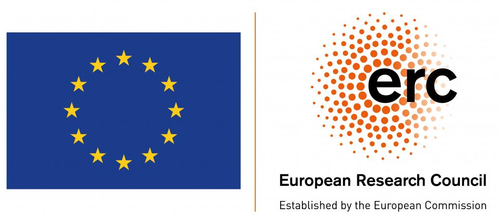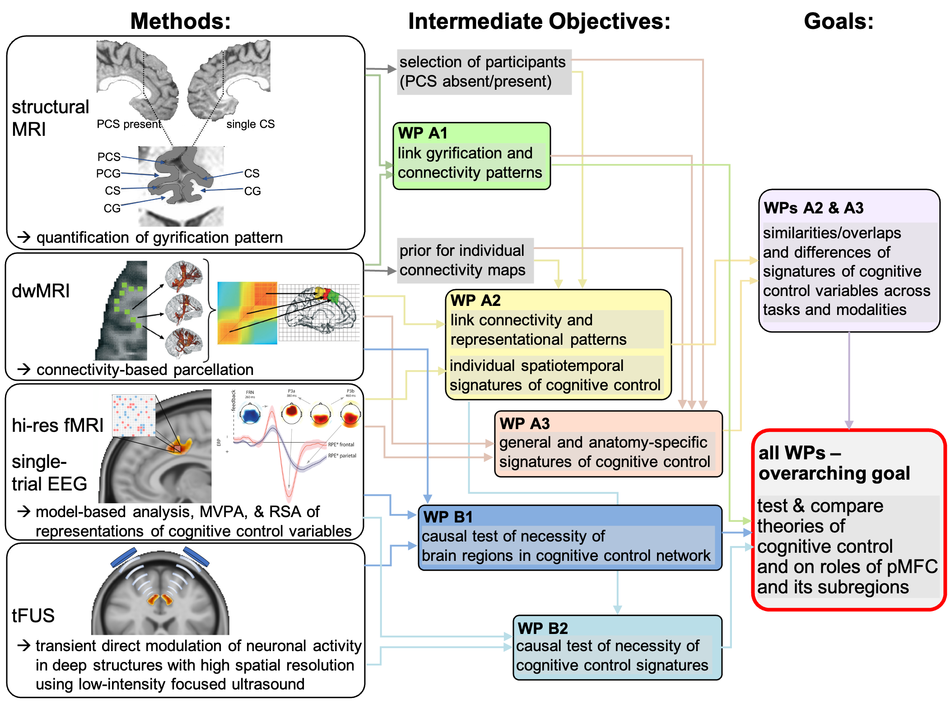
The Medial Frontal Cortex in Cognitive Control and Decision Making:
Anatomy, Connectivity, Representations, Causal Contributions
MediCoDe
| Principal Investigator (PI): | Prof. Dr. Markus Ullsperger |
| Host institution: | Otto-von-Guericke University Magdeburg, Germany |
| Second beneficiary: | Radboud University Nijmegen, Netherlands |
| Project start date: | February 1, 2022 |
| Project end date: | January 31, 2027 |
Cognitive control enables humans to flexibly adapt their behavior for goal achievement. Despite intensive research we still miss an overarching understanding of cognitive control and its main underlying structure, the posterior medial frontal cortex (pMFC). This is due to insufficient consideration of pMFC neuroanatomy, its subregions and individual variability; low sensitivity of conventional group-level studies; diffuse use of multiple methods and paradigms in disparate studies impeding differentiation of general cognitive-control principles from study idiosyncrasies; sparsity of causal evidence in humans.
This project proposes a radical shift in tackling these issues by two novel approaches:
A) Within-subject multimodal dense sampling and representational modeling considering individual neuroanatomy will provide a fine-grained spatiotemporal mapping of representations of cognitive-control and decision-making variables to connectivity-based pMFC subregions and enable discriminating between competing theories. The rationale is that representations of latent constructs of cognitive control must generalize across tasks and contexts. In multiple sessions behavior, fMRI, EEG, eye movements and autonomic reactions are recorded while participants perform tasks enabling to estimate cognitive control variables (CCV) from behavior and computational models. Representational similarity analysis of CCVs across tasks and modalities in a regression framework will identify signatures of core theoretical components of cognitive control.
B) A novel stimulation method using low-intensity transcranial focused ultrasound (TUS) noninvasively modulates neuronal activity in deep brain structures with excellent spatial resolution. TUS combined with EEG and fMRI will causally test the necessity of CCV representations in pMFC and its network for adaptive behavior.
The project will open up new research avenues to address individual differences and pathological changes in cognitive control.
Deutschsprachige Projektbeschreibung
Hier finden Sie eine deutschprachige Projektbeschreibung.
Team
| Markus Ullsperger: PI |  |
| Camila Silveira Agostino, postdoc: TUS, eye tracking, dense sampling |  |
| Jovita Brüning, postdoc: task development, dense sampling, multitasking |  |
| Yannick Hill, PhD student: morphometry, connectivity of the medial wall |  |
| Hans Kirschner, postdoc: dense sampling, computational modeling, multivariate analyses | |
| Chris Stolz, postdoc: reinforcement learning, dense sampling, morphometry | |
| Jonathan Hils, student assistant |  |
Collaborators
Lennart Verhagen, Donders Institute for Brain, Cognition and Behavior, Nijmegen, Netherlands
Martin Hebart, MPI for Human Cognitive and Brain Sciences, Leipzig

This project has received funding from the European Research Council (ERC) under the European Union’s Horizon 2020 research and innovation programme (grant agreement No 101018805).




